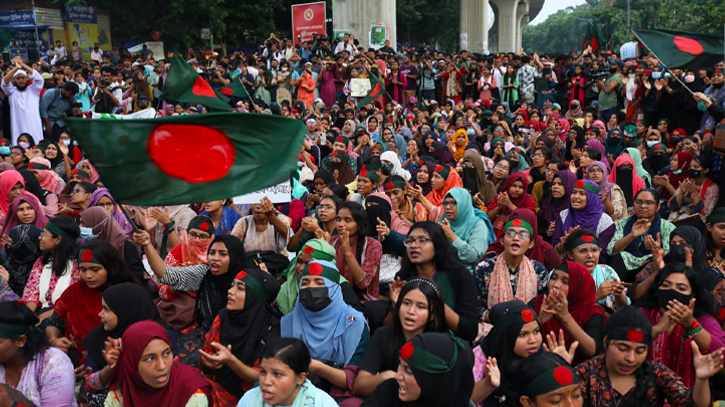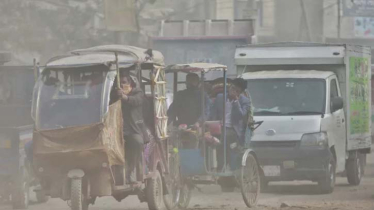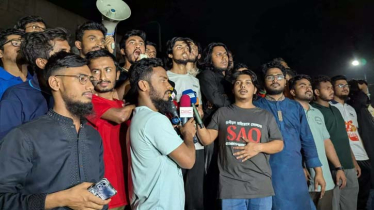
Photo: Collected
The recent quota reform movement in the country has inadvertently shifted public attention away from the government's ongoing anti-corruption efforts. As protests and violence related to the movement for reforming the quota system in public service recruitment have intensified, media coverage and public discourse have pivoted sharply. This sudden change in focus has provided an unexpected respite for those under scrutiny in various corruption investigations, temporarily slowing the momentum of the anti-graft campaign that had been gaining significant traction in recent months.
Officials and analysts said that as corrupt individuals were being exposed in the media, the unrest surrounding the students' movement has inadvertently provided cover for those under scrutiny. However, prominent figures have urged the government not to let corrupt individuals escape accountability. They warn that if the anti-corruption campaign loses momentum, the country's socio-economic condition could deteriorate significantly in the coming years.
Former secretary AKM Awal Majumdar told The Daily Messenger, “The main problem of the country is corruption. There is negligence in recruitment and posting. Honest officers and employees will be discouraged if measures are not taken after impartial judgment and analysis, and if the anti-corruption drive is covered up. If the campaign against corruption is not ongoing, the country's socio-economic condition will become more dire.”
Recently, there was a kind of awakening against corruption in the country. Almost every day, the misdeeds of corrupt government officials and employees who had amassed illegal wealth were being published one after another in the media. Prime Minister Sheikh Hasina also announced that an anti-corruption campaign had started in the country.
But with the recent violence surrounding the quota reform movement, much of the corruption news has vanished from the media. The activities of investigative institutions have also slowed down. Corrupt people have temporarily benefited from this. Questions have also been raised in various circles about whether there is any involvement of corrupt individuals behind the vandalism to divert the anti-corruption campaign to different sectors.
The news of irregularities and corruption involving some police officers, including former Inspector General of Police Benazir Ahmed, National Board of Revenue (NBR) member Matiur Rahman, Public Service Commission (PSC) chairman's former driver Abed Ali, and former peon of the Prime Minister Jahangir Alam, came up in nationwide discussion recently.
At that time, on the orders of the Prime Minister, a purge campaign started among government officials and employees. In addition to the ACC's investigation, the media also began to publish news about who had amassed wealth illegally and who was recklessly corrupt. Due to the government's goodwill, news of many instances of corruption has come out in recent times.
An initiative was also started to publish the list of cadres in the administration through Abed Ali, the former driver of the PSC chairman. It is alleged that officials who were appointed to various cadres by buying questions through Abed Ali have now become owners of huge wealth through corruption in various important positions.
Several officials of the administration said that as the ACC has already started the investigation into the PSC question leak, many sensational details will come out in public. Therefore, it is necessary to find out whether these corrupt officials fueled the violence from behind to escape the investigation. Similarly, they and their subordinate officers are also angry after the news of corruption involving some senior police officers came out. Their role during the violence was also said to be mysterious.
Former senior secretary Abu Alam Shahid Khan told The Daily Messenger, “The government cannot avoid responsibility for the official-employee corruption that has recently come to light. The concerned people must take responsibility.”
He also said that the responsibility of intelligence chiefs is to inform the head of government of daily events. The ruling political party also has responsibility. Where corruption has taken place, the leaders and activists will also know. The problem is that a wall is created between those who are at the top of power, party leaders, and officials or administration officials. As a result, they have no way to report corruption.
In this regard, Dr. Iftekharuzzaman, the Executive Director of Transparency International Bangladesh (TIB), told The Daily Messenger, “Many cases of ownership of huge wealth through corruption have come to light recently. The Prime Minister disclosed the information of a former employee of her own house owning Tk 400 crore and also said that she has taken action in the matter.”
“Therefore, the government must take steps to ensure that the anti-corruption campaign does not stop due to the recent violence. At the same time, the former IGP, members of the National Board of Revenue, and others who have been accused of corruption should be held accountable through proper investigation,” he added.
Messenger/Fameema








